新目标八年级英语上册语法复习
8年级上英语语法重点和知识点归纳精讲
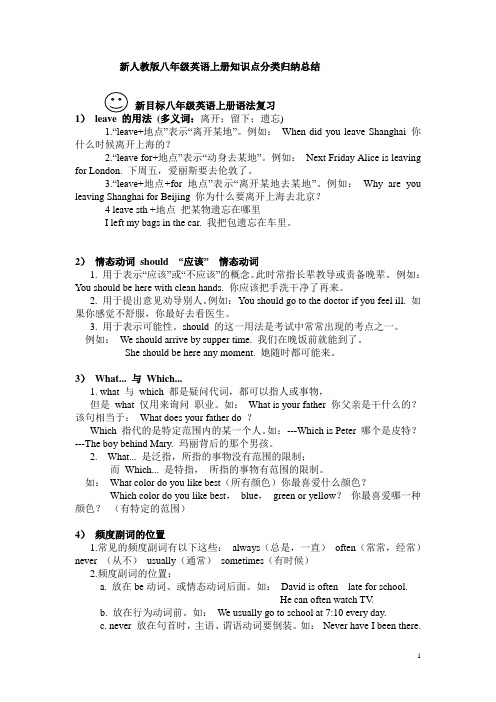
新人教版八年级英语上册知识点分类归纳总结新目标八年级英语上册语法复习1)(多义词:离开;留下;遗忘)1.“leave+地点”表示“离开某地”。
例如:When did you leave Shanghai 你什么时候离开上海的?2.“leave for+地点”表示“动身去某地”。
例如:Next Friday Alice is leaving for London. 下周五,爱丽斯要去伦敦了。
3.“leave+地点+for地点”表示“离开某地去某地”。
例如:Why are you leaving Shanghai for Beijing 你为什么要离开上海去北京?4 leave sth +地点把某物遗忘在哪里I left my bags in the car. 我把包遗忘在车里。
2)情态动词should “应该” 情态动词1. 用于表示“应该”或“不应该”的概念。
此时常指长辈教导或责备晚辈。
例如:You should be here with clean hands. 你应该把手洗干净了再来。
2. 用于提出意见劝导别人。
例如:You should go to the doctor if you feel ill. 如果你感觉不舒服,你最好去看医生。
3. 用于表示可能性。
should 的这一用法是考试中常常出现的考点之一。
例如:We should arrive by supper time. 我们在晚饭前就能到了。
She should be here any moment. 她随时都可能来。
3)What... 与Which...1. what 与which 都是疑问代词,都可以指人或事物,但是what 仅用来询问职业。
如:What is your father 你父亲是干什么的?该句相当于:What does your father do ?Which 指代的是特定范围内的某一个人。
如:---Which is Peter 哪个是皮特?---The boy behind Mary. 玛丽背后的那个男孩。
初中英语人教新目标八年级上册Unit 6重点知识(重点语块+词形变换+重点句子)

八年级英语上册Unit 6重点知识Section A【重点语块】1.grow up长大;成熟;成长2.practice doing sth.练习做某事3.go to university/college 去上大学4.study math really hard 努力学习数学5.be good at...擅长于……6.a famous writer一位著名的作家7.keep on doing sth.继续做某事8.of course当然9.be sure about确信;对……有把握10.make sure确保;查明11.try one's best尽某人最大的努力12.move to...搬到……13.take acting lessons上表演课14. a race car driver一名赛车手15. send sb. sth./ send sth.to sb.寄给某人某物;寄某物给某人16.want sb. to do sth.想要某人做某事17. become an engineer成为一名工程师18.go to a cooking school去烹饪学校19. study medicine at a university在一所大学学医20.write articles写文章21. send them to magazines and newspapers把它们寄到杂志社和报社22. computer programmer编程人员23. see a doctor看医生24.get an education受教育25. a successful pilot一名成功的飞行员【词形变换】1. program n.程序;节目 v.编写程序→programmer n.程序员2.cook n.厨师v.烹饪→ cooker n.炊具3.violinist n.小提琴手→ violin n.小提琴4.pianist n.钢琴家→ piano n.钢琴5. scientist n.科学家→ science n. 科学→scientific adj.科学的cation n.教育→ educate v.教育→educational adj.有教育意义的→educated adj.受过教育的;有教养的→educator n.教育家;教育工作者7.worry v.担心;担忧→ worried adj.焦虑的;担心的→ worrying adj.令人担忧的;令人发愁的8.medicine n.药;医学→medical adj.医学的9.send v.邮寄;发送→sent (过去式)10.drive v.驾驶;开车→ driver n.驾驶员;司机【重点句子】1.—What do you want to be when you grow up ?1一I want to be an engineer.—你长大后想当什么?—我想当一名工程师。
人教新目标英语八年级上册Unit1-3重点词组句子及语法
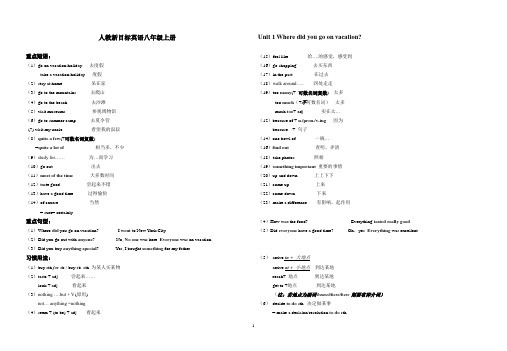
人教新目标英语八年级上册Unit 1 Where did you go on vacation?重点短语:(1)go on vacation/holiday 去度假take a vacation/holiday 度假(2)stay at home 呆在家(3)go to the mountains 去爬山(4)go to the beach去沙滩(5)visit museums 参观博物馆(6)go to summer camp 去夏令营(7) visit my uncle 看望我的叔叔(8)quite a few(+可数名词复数)=quite a lot of 相当多,不少(9)study for……为…而学习(10)go out 出去(11)most of the time 大多数时间(12)taste good 尝起来不错(13)have a good time过得愉快(14)of course 当然= sure= certainly (15)feel like 给….的感觉,感受到(16)go shopping 去买东西(17)in the past 在过去(18)walk around…..四处走走(19)too many(+ 可数名词复数) 太多too much(+不可数名词)太多much too+ adj. 实在太…(12)because of + n./pron./v-ing 因为because + 句子(14)one bowl of 一碗…(16)find out 查明,弄清(18)take photos 照相(19)something important重要的事情(20)up and down 上上下下(21)come up 上来(22)come down 下来(23)make a difference 有影响,起作用重点句型:(1)Where did you go on vacation? I went to New York City.(2)Did you go out with anyone? No, No one was here. Everyone was on vacation. (3)Did you buy anything special? Yes, I bought something for my father. (4)How was the food? Everything tasted really good. (5)Did everyone have a good time? Oh,yes. Everything was excellent.习惯用法:(1)buy sth for sb./ buy sb. sth 为某人买某物(2)taste + adj. 尝起来……look + adj 看起来(3)nothing ….but + V.(原形)not… anything =nothing(4)seem + (to be) + adj 看起来(5)arrive in + 大地点arrive at + 小地点到达某地reach+ 地点到达某地get to +地点到达某地(注:若地点为副词home/there/here则要省掉介词)(6)decide to do sth. 决定做某事= make a decision/resolution to do sth.(7) try doing sth. 尝试做某事try t o do sth. 尽力/努力/设法做某事 try one’s bes t to do sth 尽力做某事 try 过去式:tried, 三单:tries (8)enjoy doing sth . 喜欢做某事 enjoy oneself 玩得开心 (9)want to do sth . 想去做某事 (10)start / begin doing sth. 开始做某事 start / begin to do sth. 开始做某事 (11)stop doing sth. 停止正在做的某事 stop to do sth 停下来做(另一件)某事 (12)dislike doing sth. 不喜欢做某事dislike to do sth . 不喜欢做某事 (13)Why not do sth. 为什么不做…….呢? =Why don’t you do sth.(14)so + adj + that + 从句 如此…以至于 (15)tell sb. (not) to do sth.告诉某人(不要)做某事(16)keep doing sth. 一直做某事Keep on doing sth. 坚持/继续做某事 (17)forget to do sth . 忘记去做某事forget doing sth 忘记做过某事 (remember 记得, 用法一样) 语法点:1.seem 的用法(1)seem + 形容词 看起来….. You seem happy today.(2)seem + to do sth . 似乎、好像做某事 I seem to have a cold No one seemed to be bored.(3)It seems / seemed that+ 句子 看起来好像…;似乎…. It seems that no one believes you. 2. decide to do sth .决定做某事 We decided to go to the beach.. decide + 疑问词 + 动词不定式 He can not decide when to start . 3. over 介词,多于,超过,在…以上(表示数目、程度)= more than My father is over 40 years old. We waited over an hour for the train. 4. because of 因为,由于,后接名词、代词或动名词,不能接句子。
新目标英语八年级上册第一单元重点词汇、句型和语法
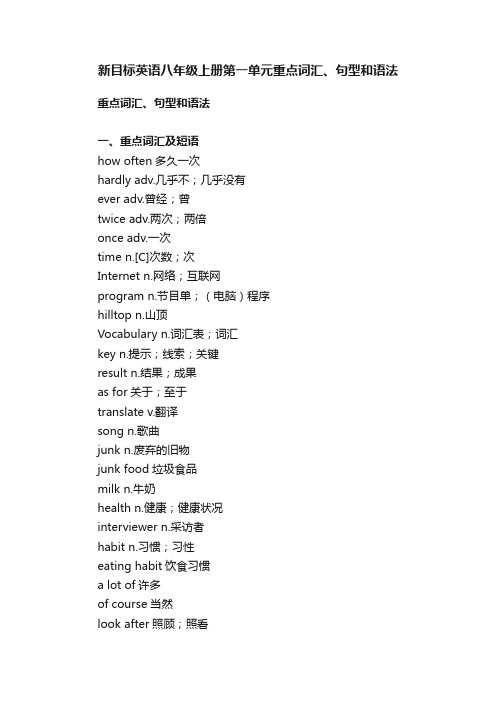
新目标英语八年级上册第一单元重点词汇、句型和语法重点词汇、句型和语法一、重点词汇及短语how often多久一次hardly adv.几乎不;几乎没有ever adv.曾经;曾twice adv.两次;两倍once adv.一次time n.[C]次数;次Internet n.网络;互联网program n.节目单;(电脑)程序hilltop n.山顶Vocabulary n.词汇表;词汇key n.提示;线索;关键result n.结果;成果as for关于;至于translate v.翻译song n.歌曲junk n.废弃的旧物junk food垃圾食品milk n.牛奶health n.健康;健康状况interviewer n.采访者habit n.习惯;习性eating habit饮食习惯a lot of许多of course当然look after照顾;照看difference n.不同;差异;区别make a difference使得结果不同;有重要性grade n.分数;年级;成绩unhealthy adj.不健康的;不益健康的yuck int.(表示反感、厌恶等)although=though conj.虽然;即使;纵然do表强调(位于实义动词前)skateboarding n.滑雪板运动start with以……开始二、重点句型和交际用语1.How often do you…?2.What do you usually do on weekends? I usually play soccer.What do they do on weekends? They often go to the movies.What does he do on weekends? He sometimes watches TV.How often do you shop? I shop once a month.How often does Chung watch TV? He watches TV twice a week.三、重要语法一般现在时的陈述句、特殊疑问句及其回答1.Some students do homework three or four times a week.2.A:How often do you watch TV?B:Twice a week.3.A:What does she do on weekends?B:She often goes to the movies.。
人教新目标八年级英语上册重难点知识点归纳
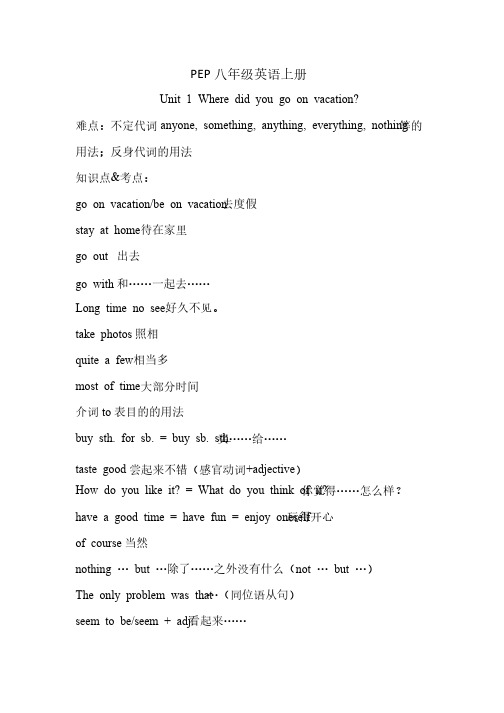
PEP八年级英语上册八年级英语上册Unit 1 Where did you go on vacation? 难点:不定代词anyone, something, anything, everything, nothing等的用法;反身代词的用法用法;反身代词的用法知识点&考点:考点:go on vacation/be on vacation 去度假去度假stay at home 待在家里待在家里待在家里go out 出去出去go with 和……一起去……和……一起去……Long time no see. 好久不见。
好久不见。
take photos 照相照相quite a few 相当多相当多相当多most of time 大部分时间大部分时间大部分时间表目的的用法介词to表目的的用法buy sth. for sb. = buy sb. sth. 买……给……买……给……taste good 尝起来不错(感官动词+adjective)How do you like it? = What do you think of it? 你觉得……怎么样?你觉得……怎么样?have a good time = have fun = enjoy oneself玩得开心玩得开心of course 当然当然nothing …but …除了……之外没有什么(not …but …)…)The only problem was that …(同位语从句)…(同位语从句)seem to be/seem + adj. 看起来……看起来……keep a diary 记日记记日记记日记 + at + 小地点小地点小地点arrive + in + 大地点大地点大地点 decide to do 决定做某事决定做某事决定做某事 try doing sth. 尝试做某事尝试做某事尝试做某事 try to do sth. 尽力做某事尽力做某事feel like 感觉到感觉到 feel like + n./ v-ing 想要……想要……ride … to …骑……到………骑……到……许多的:a lot of + 可数名词可数名词 lots of + 可数可数or 不可数名词不可数名词 I wonder that …我想知道………我想知道………我想知道…… in the past 在过去在过去在过去 enjoy doing sth. 享受做某事享受做某事享受做某事 walk around 到处逛逛到处逛逛感叹句:What + 冠词冠词 + adj. + n. + (it is) = How + adj. + 冠词冠词 + n. + (it is) start start doing doing doing sth. sth. 开始做某事开始做某事 stop stop doing doing doing sth. sth. 停止做某事停止做某事 finish finish doing doing sth. 结束做某事结束做某事because & so (不可同用)(不可同用)(不可同用) wait for …等待………等待……because of + n. a little/ a few 一些(两者的区别,以及与little/few 的区别)的区别) enough + n. / adj. + enough as + adj./adv. + as 和……一样……和……一样……one bowl of …一碗………一碗……along the way 沿着这条路沿着这条路沿着这条路 时间段+ later = after + 时间段……之后时间段……之后other, others, the other, the others, another on trip 在旅途中在旅途中find out 找到,找出找到,找出 / find 寻找寻找 / look for 寻找寻找寻找 so + adj. + that + 从句如此……以致……从句如此……以致……tell sb. (not) to do sth. 告诉某人(不要)做某事告诉某人(不要)做某事keep doing sth. / go on doing sth. 继续做某事继续做某事keep sth. + adj. 使……保持……状态使……保持……状态up and down (人)来来往往;(人)来来往往;(物)上上下下(物)上上下下in excitement = excitedly 兴奋地兴奋地come up / come out / come on / come in forget to do sth. 忘记做某事忘记做某事 forget doing sth. 忘记做过某事忘记做过某事忘记做过某事 like / dislike + n. / v-ing 喜欢/不喜欢某物/做某事做某事something + adj. ……的事情……的事情……的事情 Why not + v. = Why don ’t you + v. 为什么不……呢?为什么不……呢?Unit 2 How often do you exercise? 重点:1. How often 句型的运用;2. 2. 六个频度副词六个频度副词never, hardly ever, sometimes, sometimes, often, often, often, usually, usually, usually, always always 的差异、理解及使用;3. 频率数词once, twice 等的认识和运用;4. 一般现在时不同人称谓语形式的变化及一般疑问句的问答。
人教新目标英语八年级上册unit1-Unit4单元重点知识复习
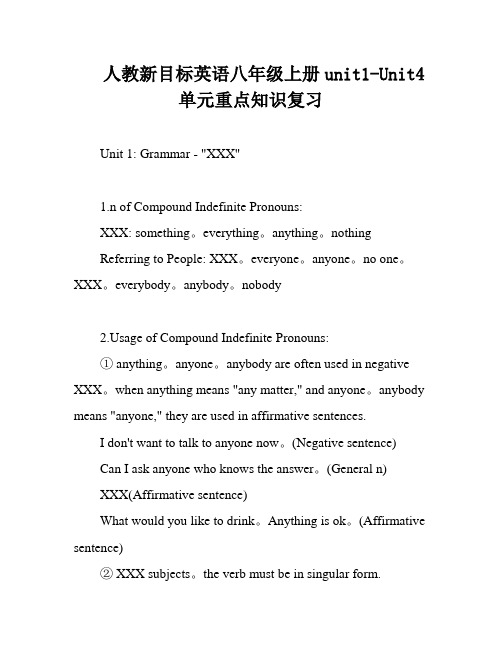
人教新目标英语八年级上册unit1-Unit4单元重点知识复习Unit 1: Grammar - "XXX"1.n of Compound Indefinite Pronouns:XXX: something。
everything。
anything。
nothingReferring to People: XXX。
everyone。
anyone。
no one。
XXX。
everybody。
anybody。
nobodyage of Compound Indefinite Pronouns:① anything。
anyone。
anybody are often used in negative XXX。
when anything means "any matter," and anyone。
anybody means "anyone," they are used in affirmative sentences.I don't want to talk to anyone now。
(Negative sentence)Can I ask anyone who knows the answer。
(General n)XXX(Affirmative sentence)What would you like to drink。
Anything is ok。
(Affirmative sentence)② XXX subjects。
the verb must be in singular form.Everyone here is from China.XXX.③ Adjectives XXX.Would you like to buy anything special?Can XXX interesting?④ When making requests。
初中英语人教新目标八年级上册全册短语汇总(分单元编排)
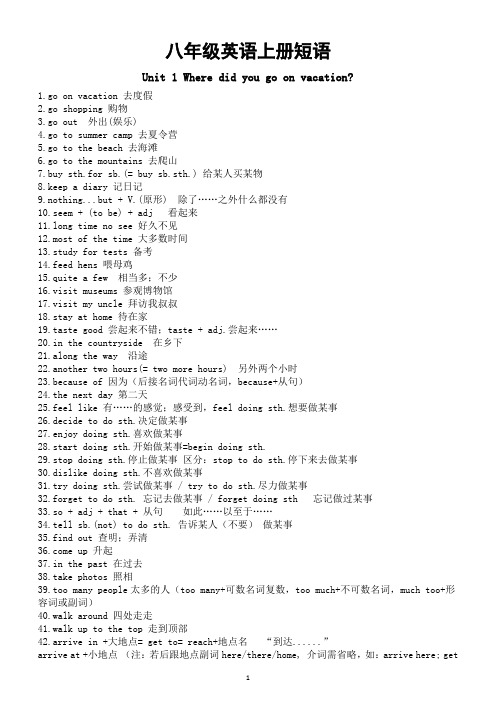
八年级英语上册短语Unit 1 Where did you go on vacation?1.go on vacation 去度假2.go shopping 购物3.go out 外出(娱乐)4.go to summer camp 去夏令营5.go to the beach 去海滩6.go to the mountains 去爬山7.buy sth.for sb.(= buy sb.sth.) 给某人买某物8.keep a diary 记日记9.nothing...but + V.(原形) 除了……之外什么都没有10.seem + (to be) + adj 看起来11.long time no see 好久不见12.most of the time 大多数时间13.study for tests 备考14.feed hens 喂母鸡15.quite a few 相当多;不少16.visit museums 参观博物馆17.visit my uncle 拜访我叔叔18.stay at home 待在家19.taste good 尝起来不错;taste + adj.尝起来……20.in the countryside 在乡下21.along the way 沿途22.another two hours(= two more hours) 另外两个小时23.because of 因为(后接名词代词动名词,because+从句)24.the next day 第二天25.feel like 有……的感觉;感受到,feel doing sth.想要做某事26.decide to do sth.决定做某事27.enjoy doing sth.喜欢做某事28.start doing sth.开始做某事=begin doing sth.29.stop doing sth.停止做某事区分:stop to do sth.停下来去做某事30.dislike doing sth.不喜欢做某事31.try doing sth.尝试做某事 / try to do sth.尽力做某事32.forget to do sth. 忘记去做某事 / forget doing sth 忘记做过某事33.so + adj + that + 从句如此……以至于……34.tell sb.(not) to do sth. 告诉某人(不要)做某事35.find out 查明;弄清e up 升起37.in the past 在过去38.take photos 照相39.too many people太多的人(too many+可数名词复数,too much+不可数名词,much too+形容词或副词)40.walk around 四处走走41.walk up to the top 走到顶部42.arrive in +大地点= get to= reach+地点名“到达......”arrive at +小地点(注:若后跟地点副词here/there/home, 介词需省略,如:arrive here; gethome)43.rain hard 雨下得很大=rain heavily44.bring back 带回来45.jump up and down in excitement 兴奋地跳来跳去46.learn something important 学一些重要的东西47.have a fun time 过得很愉快;玩得非常开心48.in the shopping center 在购物中心49.keep doing sth.继续做某事50.go on继续Unit 2 How often do you exercise?help with housework帮助做家务on weekends在周末how often多久一次hardly ever几乎从不once a week每周一次twice a month每月两次every day每天be free有空go to the movies去看电影use the Internet用互联网swing dance摇摆舞play tennis打网球stay up late熬夜;睡得很晚at least至少have dance and piano lessons上舞蹈课和钢琴课go to bed early早点睡觉play sports进行体育活动be good for对……有好处go camping去野营not…at all一点儿也不……in one’s free time在某人的业余时间the most popular最受欢迎的such as比如;诸如old habits die hard积习难改go to the dentist去看牙医more than多于;超过less than少于help sb.with sth.帮助某人做某事How about…? ......怎么样?/ ……好不好?want sb.to do sth.想让某人做某事How many+可数名词复数+一般疑问句?……有多少……?主语+find+that从句.……发现……spend time with sb.和某人一起度过时光It’s+ adj.+ to do sth.做某事是……的by doing sth.通过做某事the best way to do sth.做某事的最好方式Unit 3 I'm more outgoing than my sister.1.more outgoing 更外向2.as…as…与……一样……3.the singing competition 唱歌比赛4.be similar to 与……相像的 /类似的5.the same as 和……相同;与……一致6.be different from 与……不同7.care about 关心;介意8.be like a mirror 像一面镜子9.the most important 最重要的10.as long as 只要;既然11.bring out 使显现;使表现出12.get better grades 取得更好的成绩13.reach for 伸手取14.in fact 事实上;实际上15.make friends 交朋友16.the other 其他的17.touch one ’s heart 感动某人18.be talented in music 有音乐天赋19.be good at 擅长……20.be good with 善于与……相处21.have fun doing sth.享受做某事的乐趣22.be good at doing sth 擅长做某事23.make sb.do sth. 让某人做某事24.want to do sth.想要做某事25.primary school 小学Unit 4 What's the best movie theater?1.a movie theater 电影院2.close to 离……近=near3.a clothes store 服装店4.in town 在镇上5.so far 到目前为止;迄今为止6.no problem 不用谢;别客气;没什么=you're welcome7.10 minutes by bus=10 minutes' bus ride 坐公共汽车10分钟的路程8.a talent show 才艺表演节目9.more and more... 越来越……10.around the world 世界各地11.have ...in common 有相同特征;(想法、兴趣等方面)相同12.look for 寻找13.and so on 等等14.a kind of 一种all kinds of 各种类型的;各种各样的different kinds of 不同种类的15.be up to 是……的职责;由……决定16.get a good prize 获得丰厚奖品17.make up 编造(故事、谎言等)18.for example 例如19.take ...seriously 认真对待20.play a role in doing sth.“在…中发挥作用/扮演角色”e true 实现;成为现实22.watch sb.do sth.观看某人做某事23.watch sb.doing sth.观看某人正在做某事Unit 5 Do you want to watch a game show?soap opera 肥皂剧action movietalk show 访谈节目sports show 体育节目game show 娱乐节目talent show 达人秀have a discussion 进行讨论watch news 看新闻find out 找出,查出,查明on November 18,1928 在1928年11月18日first cartoon with sound and music第一步有声音和音乐的动画片in the 1930s 在20世纪30年代as famous as…和……一样著名one of the main reasons 主要的理由之一be ready to do sth. 愿意做某事;为…做准备dress up 装扮;乔装打扮take sb’s place 代替;替换do a good job 干得好let sb.do sth.让某人做某事plan to do sth.计划/打算做某事hope to do sth. 希望做某事happen to do sth.碰巧做某事expect to do sth.盼望做某事How about doing…? 做怎么样?try one’s best to do sth.尽力做某事think of 想起、认为think about 思考、考虑Unit 6 I'm going to study computer science.1.every day 每天2.grow up 长大;成熟;成长puter programmer 编程人员4.be sure about 对某事确信5.make sure 确信/有把握6.send…to…把…发送到…/把…寄…7.be able to 能/能够8.the meaning of …的意思/含义9.promise to do sth. 承诺做某事10.at the beginning of 在…开始的时候11.write down 写下/记下12.take up 开始从事/着手处理/接受13.hardly ever 几乎不14.too…to…太而不能15.study computer science 学习计算机科学16.keep on doing sth.反复做某事17.take acting/singing lessons 上表演/声乐课18.finish high school 中学毕业19.have to do with 与…有关20.for this reason 由于这个原因21.sounds like 听起来像22.the start of the year 一年的开始23.have...in common 有相同特征;(想法、兴趣等方面)相同24.agree with 同意25.different kinds of 不同种类的Unit 7 Will people have robots?on paper 在纸上on computers 在电脑上3.air pollution 空气污染4.in the future 在将来5.on the earth 在世界上6.play a part in sth.在某方面出力/做贡献7.world peace 世界和平8.in the sky 在天空中9.space station太空站10.live to be...years old活到……岁11.free time空闲时间12.in danger 在危险中13.over and over again多次;反复地14.hundreds of 成百上千的15.the same…as与…一样16.get bored 无聊17.look for 寻找18.wake up 醒来/唤醒19.look like 看起来像20.fall down倒下/落下21.fresh water淡水22.move to搬(家);搬迁23.during the holiday 在假期期间24.disagree with 不同意;反对25.be able to 有能力做某事26.look after=take care of...照顾......Unit 8 How do you make a banana milk shake?k shake 奶昔2.turn on/off 打开/关掉3.pour into 倒入4.a cup of yogurt 一杯酸奶5.a good idea 一个好主意6.on Saturday 在星期六7.cut up 切碎8.put into 放入9.one more thing 还有一件事10.a piece of一片/一张/一块11.at this time在此时12.a few 几个13.fill…with…用…装满14.cover…with…用…盖住15.one by one一个接一个16.a long time长时间17.First …Next…Then…Finally首先……接下来……然后…… .最后……Unit 9 Can you come to my party?1.on Saturday afternoon=on the afternoon of Saturday在星期六下午2.have to不得不,必须3.go to the/a doctor=see the/a doctor去看病4.have the flu患流感5.help my parents帮助我的父母e to the party参加聚会7.meet my friend见朋友8.too much homework太多的家庭作业9.go to the party参加聚会10.another time其他时间st fall=last autumn去年秋天12.hang out闲逛13.after school放学后14.on the weekend在周末15.go to the movies去看电影16.study for a test备考17.visit grandparents拜访爷爷奶奶18.prepare for为…做准备19.turn down拒绝;调低20.take a trip去旅行21.go shopping去购物22.do homework做家庭作业23.the day before yesterday前天24.the day after tomorrow后天25.not…until…直到......才......26.have a piano lesson上钢琴课27.accept an invitation接受邀请28.look forward to...盼望,期待29.at the end of this month在这个月末30.go to the concert去听音乐会31.reply in writing书面回复32.the opening of…的开幕式/落成典礼Unit 10 If you go to the party,you 'll have a great time!1.go to the party 参加晚会2.have a great /good time 玩的开心3.stay at home,呆在家4.take the bus乘公交车5.tomorrow night明天晚上6.have a class party 开班级晚会7.have a class meeting 开班会8.half the class 全班一半人9.make some food 做食物10.at the party 在晚会上11.order food 预定食物12.be angry with sb.对某人生气/be angry at/about sth 因某事而生气13.give sb some advice给某人建议/劝告14.travel around the world 周游世界15.go to college 上大学16.make(a lot of)money 挣钱/赚钱17.get an education上学/受教育18.work hard 努力工作/努力学习19.keep…to oneself 把…留给自己/独处/避免与人交往20.talk to sb.与某人谈话21.in life在一生中22.in the end 在最后23.make mistakes 弄错/出差错24.in the future 在将来25.run away逃跑26.the first step第一步27.in half 成半28.solve a problem 解决难题29.school clean-up学校大扫除。
新目标八年级英语上册unit2语法总结

新目标八年级英语上册unit2语法总结新目标八年级英语上册unit2语法总结Unit2What’sthematter?1.kindof=abit=alittle一点儿(表示程度) e.gI’mkindof/abit/alittleunhealthy.我有点儿不安康。
2.alittle+n.=abitof+n3.should,can,will,would,may,need,must这些情态动词不能加S,没有第三人称单数形式。
4.starttodosth=startdoingsth开头做某事5.wish/hopetodosth Wishsbtodosth(此处wish不能改为hope,没有hopesbtodosth的用法)6.Ihopeso我盼望如此。
否认形式:Ihopenot.我不盼望如此。
7.Ithinkso.否认:Idon’tthinkso.3aAhealthylifestyle,theChineseway8.insomeways在某些方面9.onone’swayto+n在某人去的道路上(onmywaytoschool在我去学校的路上onmywaytosuccess在我通往胜利的道路上)10.inthisway用这种方法e.gInthisway,youcangetgoodgrades.11.abalanceofAandBA和B的平衡12.forexample举个例子13.needtodosth需要做某事e.gIneedtocutmyhair.我需要理发。
Needdoingsth=needtobedone需要被做某事e.gMyhairneedcutting.=Myhairneedtobecut.我的头发需要被剪。
14.sthbepopularwithsbe.gChinesemedicineisnowpopularwithpeopleinwesterncountries.15.I t’s+adj.(形容词)+todosth做某事怎么样e.gIt’seasytohaveahealthylifestyle.It’simportanttohavegoodhabits.16.believe认为e.gIbelieveit’simportanttosleepeighthoursanight.我认为每晚睡八小时很重要。
新目标(Go for it)八年级英语上册全一册短语、语法知识点汇总(打包10套)8
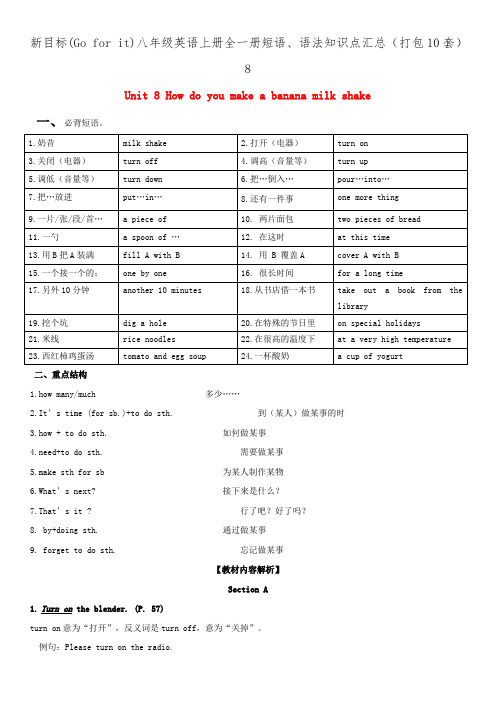
新目标(Go for it)八年级英语上册全一册短语、语法知识点汇总(打包10套)8Unit 8 How do you make a banana milk shake一、必背短语。
二、重点结构1.how many/much 多少……2.It’s time (for sb.)+to do sth. 到(某人)做某事的时3.how + to do sth. 如何做某事4.need+to do sth. 需要做某事5.make sth for sb 为某人制作某物6.What’s next?接下来是什么?7.That’s it ?行了吧?好了吗?8. by+doing sth. 通过做某事9. forget to do sth. 忘记做某事【教材内容解析】Section A1.Turn on the blender. (P. 57)turn on意为“打开”,反义词是turn off,意为“关掉”。
例句:Please turn on the radio.例句:Don’t forget to turn off the light.2.Cut up the bananas. (P. 57)cut up意为“切碎”,相当于cut into pieces。
例句:Hand the meat to me. I’ll cut it up.例句:Please help me cut up the apple.3.Pour the milk into the blender. (P. 57)pour...into...表示“将……倒进……里面”,pour...out表示“把……倒出来”。
例句:Please pour the water into the bowl.例句:Please pour the milk out.4.How do you make a banana milk shake?(P. 57)make用作实义动词,表示“制作、做”,make sb. sth.相当于make sth. for sb.“为某人制造某物”。
人教新目标八年级英语上册1-4单元语法点总结
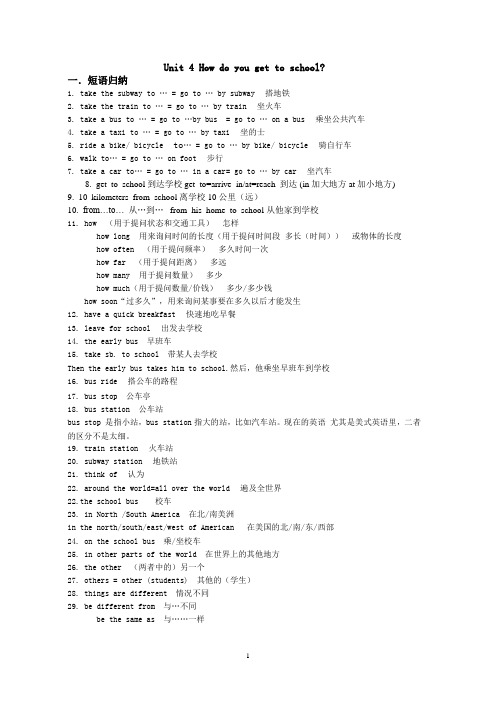
Unit 4 How do you get to school?一.短语归纳1. take the subway to …= go to … by subway搭地铁2. take the train to …= go to … by train坐火车3. take a bus to …= go to …by bus= go to … on a bus乘坐公共汽车4. take a taxi to …= go to … by taxi坐的士5. ride a bike/ bicycle to…= go to … by bike/ bicycle骑自行车6. walk to…= go to … on foot步行7. take a car to…= go to … in a car= go to … by car坐汽车8. get to school到达学校get to=arrive in/at=reach 到达 (in加大地方at加小地方)9. 10 kilometers from school离学校10公里(远)10. from…to…从…到…from his home to school 从他家到学校11. how(用于提问状态和交通工具)怎样how long用来询问时间的长度(用于提问时间段多长(时间))或物体的长度how often(用于提问频率)多久时间一次how far(用于提问距离)多远how many用于提问数量)多少how much(用于提问数量/价钱)多少/多少钱how soon“过多久”,用来询问某事要在多久以后才能发生12. have a quick breakfast快速地吃早餐13. leave for school出发去学校14. the early bus 早班车15. take sb. to school 带某人去学校Then the early bus takes him to school.然后,他乘坐早班车到学校16. bus ride搭公车的路程17. bus stop 公车亭18. bus station 公车站bus stop 是指小站,bus station指大的站,比如汽车站。
新版新目标英语八年级上册知识点总结

U n i t1W h e r e d i d y o u g o o n v a c a t i o n1.go on vacation去度假vacation假期、假日=holiday,on vacation = on holiday 度假the long vacation 长假the summer vacation 暑假 the Christmas vacation 圣诞假期goonvacation/tothemountains/tothebeach/tosummercamp 去度假,去爬山,去沙滩,去夏令营2.buy anything special 买特别的东西1buy v买;购买过去式为bought buysb.sth=buysthforsb. 给某人买某物2anything不定代词,某事;某件东西主要用于疑问句或否定句中Do you want to buy anything for meI can’t say anything about it.3)anthing special特别的东西 adj修饰不定代词时后置4 something,anything,nothing,everything是指物的不定代词;somebody,someone,anybody,anyone, nobody,everybody,everyone是指人的不定代词;somewhere,anywhere,nowhere,everywhere是指地点的不定代词;5 这些不定代词做主语时,谓语动词用第三人称单数 Is everybody here 大家都到齐了吗6 something,somebody,someone,somewhere用于肯定句及表示请求或建议的疑问句中,而anything, anybody,anyone,anywhere用于否定句及疑问句中;Did you do anything interesting 你做了有趣的事吗表疑问3. anywhere adv 在任何地方 Did you go anywhere during the summer vacationanywhere 在任何地方常用于否定句和疑问句中I can’t find it anywhere.somewhere 在某处;到某处常用于肯定句中 I lost my key somewhere near here.4.take photos 照相;拍照5. quite a few 很多;不少修饰可数名词复数quite a little 很多;不少修饰不可数名词afew+可数名词复数表肯定 few+可数名词复数表否定alittle+不数名词表肯定 little+不可数名词表否定6.most of the time大部分时间 most为代词,大部分;大多数most of………中的大多数它作主语时,谓语动词取决于most of后所修饰的名词Most of us are going to the park. 我们大多数人要去公园;Most of the food goes bad. 大部分的食物都变质了;7.have a good time = enjoy oneself = have fun 玩得开心 + doingWe had a good time visiting the the Great Wall.= We enjoyed ourselves visiting the the Great Wall.= We had fun visiting the the Great Wall.8.How did you like it 你觉得它怎么样How do/did you like……你觉得……怎么样用来询问对方的观点或看法,=What do you think of……=How do/did you feel about……9. go shopping去购物;去买东西=do some shopping.go+doing 形式表示去做某事,常用于表达从事某一体育活动或休闲活动go skating 去滑冰 go hiking 去徒步旅行 go sightseeing 去观光go fishing去钓鱼 go swimming 去游泳 go boating 去划船10.a friend’s farm是名词所有格形式;一般情况下,表示“有生命的人或物”的名词后面加’s,表示所属关系;The red bike is Alice’s.那辆红色的自行车是爱丽斯的;名词所有格的构成:1单数名词词尾加’s ,复数名词词尾没有s,也要加’sthe girl ‘s pen女孩的钢笔women’s shoes女鞋on Children’s Day2复数名词以s结尾的只加’the students’ reading room学生阅览室Teachers’ Day教师节3如果两个名词并列,并且分别有’s,则表示“分别有”;只后一个名词有一个’s,则表示“共有”:John’s and Kate’s rooms.约翰和凯特各自的房间;Lily and Lucy’s father. 莉莉和露西的爸爸同一个爸爸;4表示无生命的名词一般以...of...构成短语,表示所有关系;a map of China一幅中国地图 the name of the story那个故事的名字11.seem v 好像;似乎;看来1seem+adj. 看起来…… You seem happy today.你今天看起来很高兴;2seem+to do sth. 似乎,好像做某事I seem to have a cold.我似乎感冒了;=It seems that I have a cold.3)It seems/seemed+从句看起来好像…;似乎…It seems that no one believes you.看起来好像没有人相信你4 seem like 好像,似乎12.nothing much to do 没什么事可做nothing...but... 除....之外什么也没有,只有 but+ n/v原形I have nothing to do but watch TV.Thereisnothingmuchtodobutread.除了读书没什么可做的13. bored boringbored 厌烦的;感到无聊的一般在句中修饰人boring 无聊的;令人厌烦的一般在句中修饰事或物beboredwith对…感到无聊interested adj. 感兴趣的 interesting adj. 有趣的 surprised adj. 感到惊奇的surprising adj. 惊奇的tired 累的 tiring 令人疲惫的 excited 兴奋的 exciting 令人兴奋/激动的amazed 惊讶的 amazing 令人惊讶的14.say about 发表对....的看法enjoyable adj 愉快的;快乐的 enjoy doing sth . 喜欢做…乐意做…enjoy oneself =have a good = have fun 过得愉快15.arrive v 到达 arrive in表示到达较大的地方,如国家、省、市等arrive at表示到达较小的地方,如机场、商店、广场、村庄等;地点副词home,here,there前介词省略arrive in+大地点 / arrive at+小地点②get to +地点③reach+地点16.decide v 决定 n decisiondecide to do sth. 决定做某事 decide not to do sth决定不要做某事decide on doing sth. 决定做某事make a decision to do sth.decidetodosth=makeadecisiontodosth决定做某事decide后常跟疑问词+动词不定式做宾语17.try v 其后常接名词、动名词或不定式,尝试;试图,设法;努力1trytodosth努力做…表示想尽一切办法要把事情办成,强调付出努力设法去完成;2trydoingsth尝试做表示一种尝试、做做看的想法,不一定付出很多努力;3try/doone’sbesttodo尽力做4haveatry试一试 try n 尝试18.feel like给……的感觉;感受到其后常接从句;He feels like he is swimming. 他感觉像在游泳一样;feel like 想要……其后可接名词、代词或动名词;feel like sth. 想要某物 feel like doing sth. 想要做某事19. building n 建筑物;楼房build v建造,建筑built,built,The workers built many tall buildings in our school last year.20.wonder v 想知道;琢磨其后常接who, what, why等疑问词引导的宾语从句;I wonder what they were doing here.我想知道他去哪里了;21.walk around 四处走走He’s just walking around the village.他只是在村庄里随便走走;22.difference n 差别,差异 adj different不同的;有差异的What is the difference between this book and that book My schoolbag is different from yours.1tellthedifferencesbe tween..and…说出…与…的区别2makeadifferenceto对…有影响,有意义3 be different from 与……不同 be the same as23. 常用的感叹句的结构:1What +adj.+ 复数名词 / 不可数名词+主语+谓语2What +a/an+adj.+可数名词单数+主语+谓语3How +adj. +a/an+可数名词单数+主语+谓语4How+adj./adv. +主语+谓语What an interesting book it is = How interesting a book is 那本书多么有趣啊24. want to do sth. =想要做某事 start doing sth. 开始做某事=start to do sth.take the train 乘火车”,take乘坐25.a little 一点儿修饰动词、形容词或副词;也可修饰不可数名词;26. wait for等候其后可接人或物Tom was waiting for a bus over there.27. over prep多于;超过=more than;My father is over 40 years old.There are over eight hundred students in our school.28. too many 太多其后接可数名词复数; He always has too many questions to ask me.too many + 可数名词复数太多...too much + 不可数名词太多...much too + 形容词 /副词太...29. becauseof+宾语名词/动名词/代词因为,由于becauseconj.+句子因为引导状语从句I didn’t buy the shirt because it was too expensive.He lost his job because of his age.30. below 表示下方,低于反义词为 above 在......上面under表示在正下方31. bring 带来;拿来指从别处带到说话者所在地take 拿走;带走指从说话者所在地带到别处去bring sth.to +地点,带来其反义词是takePlease bring your book to our school. 请把你的书带到我们学校来;Please take your book to your school. 请把你的书带到你的学校去;32.enough adj 足够的,充分的修饰adj或adv,一般置于被修饰词之后1enough+n足够多的用来修饰名词时放在名词之前2adj/advenoughtodosth足够…We have enough time to do our homework. The box is big enough.33. forget to do sth.与forget doing sth.forget to do sth. 忘记要做某事事情还没做Don’t forget to close the window.forget doing sth. 意为“忘记做过某事事情已经做过了 I forget closing the window.stoptodo停下来去做另外一件事,stopdoing停下来做某事34.why not为什么不呢一般用在疑问句中,表示提建议;why not后面需跟动词原形;Why not + 动词原形 =Why don’t you+ 动词原形Why not go to the party with me =Why don’t you go to the party with me提建议的句子What/ how about +doing sth. Why don’t you + do sth. Why not + do sth.Let’s + do sth. Shall we/ I + do sth.35. with prep 具有;带有with作介词时的其他用法1“和……一起’ I often go to school ______ my friend. 我经常和朋友们一起去上学;2以手段、材料,用工具, Cut the apple with a knife. 用刀切苹果;36.s o … that 如此…以致于引导结果状语从句,so adv+adj/adv. that+从句She was so sad that she couldn’t say a word. 她悲伤得一句话也说不出来;so that 引导目的状语从句以便,为了so…that…/ such…that…如此…以致引导的结果状语从句so+adj./adv.+that…He is ____lovely a boy____we love him very much.The little boy is so young that he can’t go to school.37. tell sb not to do sth. 告诉某人不要做某事keep doing sth. 继续做某事,一直做某事38. jump up and down in excitement. 兴奋地蹦上蹦下up and down 上上下下;来来回回在句中作状语;They looked me ______ ______ ______. 他们上上下下打量我;He walks______ ______ ______ in the room. 他在房间里来回走动;jump into 跳入 jump off 跳离 jump over 跳过 jump out of 跳出39. comeup太阳出来;出现,发生40. 反身代词:myself , ourselves, yourself , yourselves, himself, herself, itself, themselves.作动词或介词的宾语:经常在enjoy, teach, hurt, buy, introduce, dress, kill等动词和by, for, to, of等介词后作宾语;一年主考宾语回自身He is teaching himself English.她在自学英语;talk to oneself自言自语 live by oneself独自住 Help yourself 请随便吃吧/请自己去取吧Make yourself at home 别客气 make yourself heard /understood. 使你的话被人听得见/理解 teach oneself 自学=learn by oneself by oneself 独自for oneself 为自己;替自己 enjoy oneself 玩的愉快 dress oneself 给自己穿衣41. onthetopof在…的上面 takeanumbrellawithsth随身携带一把伞longtimenosee好久不见 inthecountryside在农村keepadiary记日记 enjoydoing享受做… walkuptosp.往上走到某地rideabiketosp.=gotosp.onthebike=gotosp.bybike骑自行车去某地rainhard/heavily雨下得大 abowof一碗42. taste good 尝起来好吃系动词+adjkeep保持stay保持seem好像look看来像smell闻起来sound听起来taste尝起来feel摸起来。
新目标英语八年级上册grammar focus整理
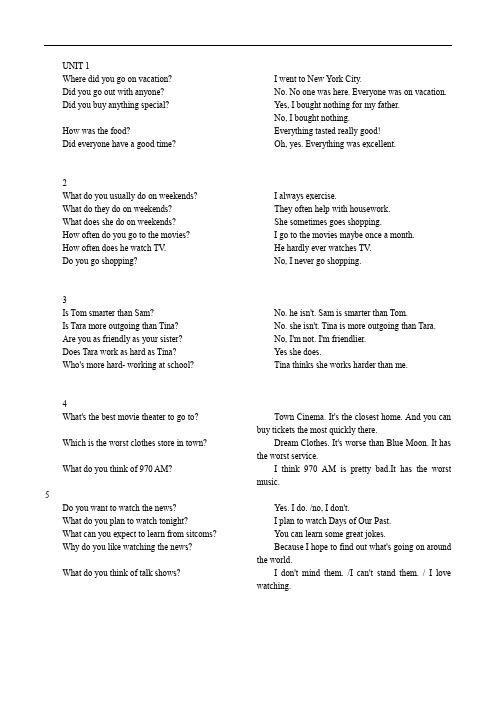
UNIT 1Where did you go on vacation? Did you go out with anyone? Did you buy anything special?How was the food?Did everyone have a good time? I went to New York City.No. No one was here. Everyone was on vacation. Yes, I bought nothing for my father.No, I bought nothing.Everything tasted really good!Oh, yes. Everything was excellent.2What do you usually do on weekends? What do they do on weekends?What does she do on weekends? How often do you go to the movies? How often does he watch TV.Do you go shopping? I always exercise.They often help with housework.She sometimes goes shopping.I go to the movies maybe once a month. He hardly ever watches TV.No, I never go shopping.3Is Tom smarter than Sam?Is Tara more outgoing than Tina? Are you as friendly as your sister? Does Tara work as hard as Tina? Who's more hard- working at school? No. he isn't. Sam is smarter than Tom.No. she isn't. Tina is more outgoing than Tara. No, I'm not. I'm friendlier.Yes she does.Tina thinks she works harder than me.4What's the best movie theater to go to? Which is the worst clothes store in town? What do you think of 970 AM?Town Cinema. It's the closest home. And you can buy tickets the most quickly there.Dream Clothes. It's worse than Blue Moon. It has the worst service.I think 970 AM is pretty bad.It has the worst music.5Do you want to watch the news?What do you plan to watch tonight?What can you expect to learn from sitcoms? Why do you like watching the news?What do you think of talk shows?Yes. I do. /no, I don't.I plan to watch Days of Our Past.You can learn some great jokes.Because I hope to find out what's going on around the world.I don't mind them. /I can't stand them. / I love watching.6What do you want to be when you grow up? How are you going to do that?Where are you going to work?When are you going to start?I want to be an engineer.I'm going to study math really hard.I'm going to move to Shanghai.I'm going to start when I finish high school and college.7What will the future be like?Will people use money in 100years? Will there be world peace?Kids will study at home on computers.Cities will be more polluted. And there will be fewer trees.No, they won't. Everything will be free.Yes, I hope soThey won't go to schoolThere will be more people. There will be fewer trees. There will be more pollution. There will be less free time.8How do you make a banana milk shake? First, peel the bananas.Next, put the bananas in the blenderThen, pour the milk into the blenderFinally, turn on the blendeHow many bananas do we need? How much yogurt do we need? We need three bananas. We need a cup of yogurt.9Can you come to my party on Saturday?Can you go to the movies tomorrow night?Can he go to the party?Can she go to the baseball game?Can they go to the movies?Sure, I'd love to. Sorry,I must study for a math test.Sure. That sounds great.I'm afraid not. I have the flu.No, he can't. He has to help his parentsNo. she's not available. She must go to the doctor.No, they’re not free. They might have to meet their friends10I think I'll take the bus to the party.I think I'll stay at home.What will happen if they have the party today? Should we ask people to bring food?If you do, you'll be late.If you do, you'll be sorry.If they have it today, half the class won't come today?If we ask people to bring food, they'll just bring potato chips and chocolate.八年级新目标英语上册grammar focus全部句子汉译英Unit 11.你去哪里度假?我去纽约。
(完整)新目标八年级上册英语语法知识点精讲+练习,推荐文档
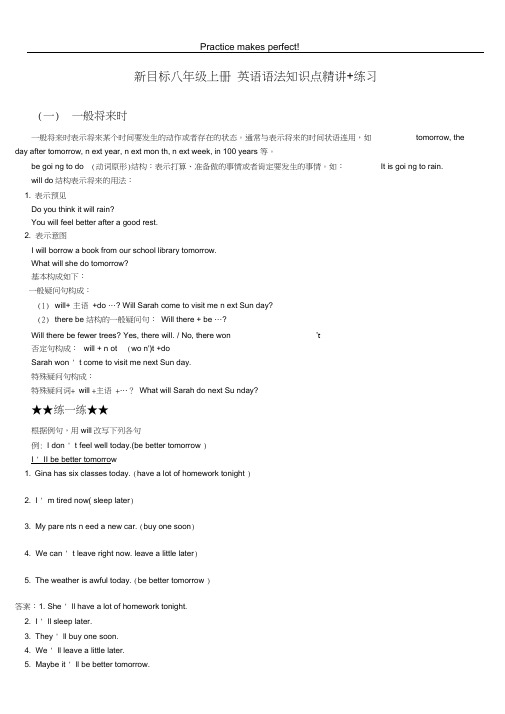
新目标八年级上册英语语法知识点精讲+练习(一)一般将来时一般将来时表示将来某个时间要发生的动作或者存在的状态。
通常与表示将来的时间状语连用,如tomorrow, the day after tomorrow, n ext year, n ext mon th, n ext week, in 100 years 等。
be goi ng to do (动词原形)结构:表示打算、准备做的事情或者肯定要发生的事情。
如:It is goi ng to rain.will do结构表示将来的用法:1. 表示预见Do you think it will rain?You will feel better after a good rest.2. 表示意图I will borrow a book from our school library tomorrow.What will she do tomorrow?基本构成如下:一般疑问句构成:(1)will+ 主语+do …? Will Sarah come to visit me n ext Sun day?(2)there be 结构的一般疑问句:Will there + be …?Will there be fewer trees? Yes, there will. / No, there won 't否定句构成:will + n ot (wo n')t +doSarah won ' t come to visit me next Sun day.特殊疑问句构成:特殊疑问词+ will +主语+…?What will Sarah do next Su nday?★★练一练★★根据例句,用will改写下列各句例: I don ' t feel well today.(be better tomorrow )I ' II be better tomorrow1. Gina has six classes today. (have a lot of homework tonight )2. I ' m tired now( sleep later)3. My pare nts n eed a new car. (buy one soon)4. We can ' t leave right now. leave a little later)5. The weather is awful today. (be better tomorrow )答案:1. She ' ll have a lot of homework tonight.2. I ' ll sleep later.3. They ' ll buy one soon.4. We ' ll leave a little later.5. Maybe it ' ll be better tomorrow.(二)should 的用法:should用来提出建议和忠告,后边加动词原形,否定句直接在should后边加not.例如:I think you should eat less junk food.我认为你应该少吃垃圾食品。
人教新目标英语八年级上册 Unit 1 sectionA语法知识点总结

人教新目标英语八年级上册Unit 1 sectionA语法知识点总结Unit 1 Where did you go on vacation?一般过去时态的概念:1.表示过去某时间发生的动作或存在的状态。
2.表示过去经常性习惯性的动作。
一般过去时常用的标志词有:yesterday,the day before yesterday,last week/month/year, just now, …ago,in+过去时间…一.用Be动词的一般过去时(1)肯定句式:主语+ was / were + 其它.(2)否定句式:主语+ wasn’t /weren’t+ 其它.(3)一般疑问句:Was/Were + 主语+ 其它?肯定回答:Yes,主语+ was / were .否定回答:No,主语+ wasn’t /weren’t.(4)特殊疑问词+was/were+主语+其他?肯定句:The air was clean yesterday.否定句:The air wasn't clean yesterday.一般疑问句:Was the air clean yesterday?肯定回答:Yes, it was.否定回答:No, it wasn't.特殊疑问句:How was the air yesterday?二.行为动词(v.)的一般过去时态(1)肯定句式:主语+ v-ed+ 其它.【do , does---did】(2)否定句式:主语+ didn’t + v原形+ 其它. 【did not = didn’t】(3)一般疑问句:Did + 主语+ v原形+ 其它?肯定回答:Yes,主语+did.否定回答:No,主语+did’t.(4)特殊疑问词+did+主语+v.原形+其他?肯定句:I rode a horse last Sunday.否定句:I didn‘t ride a horse last Sunday.一般疑问句:Did you ride a horse last Sunday? 肯定回答:Yes, I did.否定回答:No, I didn't.特殊疑问句:(1)What did you do last Sunday?(2)When did you ride a horse?三、动词过去式的构成1. 规则动词的过去式1) 一般情况下,在动词原形后面加-ed。
人教新目标英语八年级上册unit1-Unit4单元重点知识复习
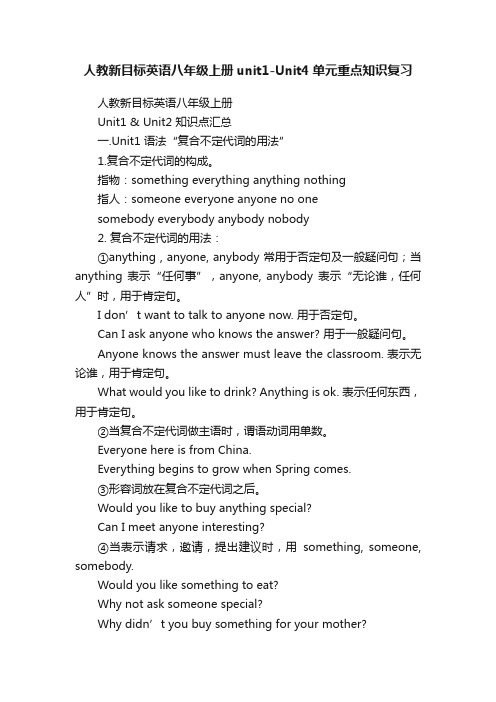
人教新目标英语八年级上册unit1-Unit4单元重点知识复习人教新目标英语八年级上册Unit1 & Unit2 知识点汇总一.Unit1 语法“复合不定代词的用法”1.复合不定代词的构成。
指物:something everything anything nothing指人:someone everyone anyone no onesomebody everybody anybody nobody2. 复合不定代词的用法:①anything , anyone, anybody 常用于否定句及一般疑问句;当anything 表示“任何事”,anyone, anybody 表示“无论谁,任何人”时,用于肯定句。
I don’t want to talk to anyone now. 用于否定句。
Can I ask anyone who knows the answer? 用于一般疑问句。
Anyone knows the answer must leave the classroom. 表示无论谁,用于肯定句。
What would you like to drink? Anything is ok. 表示任何东西,用于肯定句。
②当复合不定代词做主语时,谓语动词用单数。
Everyone here is from China.Everything begins to grow when Spring comes.③形容词放在复合不定代词之后。
Would you like to buy anything special?Can I meet anyone interesting?④当表示请求,邀请,提出建议时,用something, someone, somebody.Would you like something to eat?Why not ask someone special?Why didn’t you buy something for your mother?Unit2 语法“频率副词”How often 常用于对频率的提问,意为“多长时间一次”,其答语可以是once/ twice / three times a week; always/ usually/ often/ sometimes/ hardly ever/ never 等表示时间频率的副词及短语。
人教版新目标八年级英语上册Unit 9讲义及重点总结
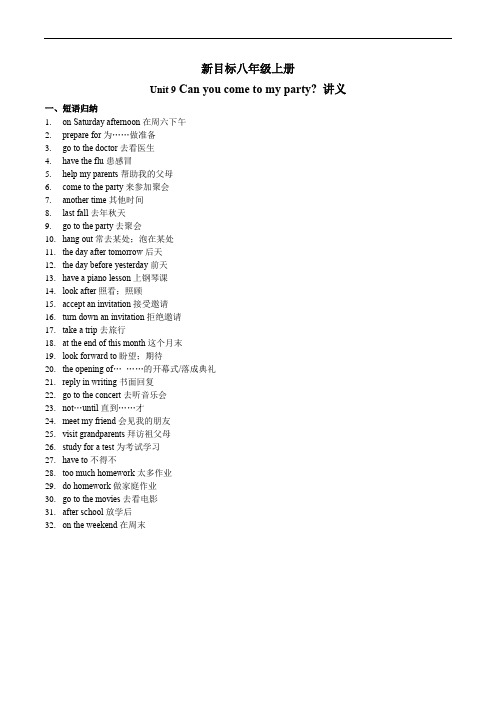
新目标八年级上册Unit 9 Can you come to my party? 讲义一、短语归纳1.on Saturday afternoon在周六下午2.prepare for为……做准备3.go to the doctor去看医生4.have the flu患感冒5.help my parents帮助我的父母e to the party来参加聚会7.another time其他时间st fall去年秋天9.go to the party去聚会10.hang out常去某处;泡在某处11.the day after tomorrow后天12.the day before yesterday前天13.have a piano lesson上钢琴课14.look after照看;照顾15.accept an invitation接受邀请16.turn down an invitation拒绝邀请17.take a trip去旅行18.at the end of this month这个月末19.look forward to盼望;期待20.the opening of………的开幕式/落成典礼21.reply in writing书面回复22.go to the concert去听音乐会23.not…until直到……才24.meet my friend会见我的朋友25.visit grandparents拜访祖父母26.study for a test为考试学习27.have to不得不28.too much homework太多作业29.do homework做家庭作业30.go to the movies去看电影31.after school放学后32.on the weekend在周末二、句型荟萃1. invite sb. to do sth. 邀请某人做某事2. what引导的感叹句结构:What+a/an+adj.+可数名词单数(+主语+谓语)!3. What+adj.+名词复数/不可数名词(+主语+谓语)!4. help sb.(to)do sth.帮助某人做某事5. be sad to do sth.做某事很悲伤6. see sb. do sth. see sb.doing sth.7. the best way to do sth.做某事最好的方式8. have a surprise party for sb.为某人举办一个惊喜派对9. look forward to doing sth.期盼做某事10. reply to sth./sb.答复某事/某人11. What’s today?今天是什么日子?What’s the date today? What day is it today?三、重难点知识讲解1. Can you come to my party on Saturday afternoon?in:用在上午下午晚上,在月份、季节和年之前;on用在星期、日期、节日和特定的某一天前。
初中英语人教新目标八年级上册Unit1-4知识要点归纳

八年级英语上册Unit1-4知识要点归纳Unit1【重点短语】1.go on vacation 去度假= take/have a vacation2.go to the mountains/the beach/summer camp去山区/海滩/夏令营3.bring back...from... 从……带回……4.quite a few/ a little/a lot (of) 相当多;不少5.study for... 为……而学习6.have a good time 玩得高兴;过得愉快= have fun/ enjoy oneself7.keep a diary 记日记8.in the past 在过去9.walk around 四处走走10.too many/much 太多11.because of 因为12.one bowl of... 一碗……13.the next day 第二天14.find out 找出;查明15.take photos 照相16.something important 重要的事17.up and down 上上下下e up 升起19.in excitement 兴奋地;激动地【重点语法】一、复合不定代词1.构成:由some,any, every,no加上one,body, thing构成的不定代词称为复合不定代词。
具体见下表:2.用法(1)复合不定代词相当于名词,在句中可以作主语、宾语和表语,但不能作定语。
There is someone outside the door.(主语)门外有人。
I don't have anything to say today(宾语)我今天没什么可说的。
Money isn't everything.(表语)金钱不是一切。
(2)复合不定代词被形容词、动词不定式等修饰时,形容词和动词不定式等应置于其后。
I have something important to tell you.不定代词形容词我有重要的事情要告诉你。
人教新目标八年级英语上册Unit 1-Unit5复习单元语法专练(含答案)
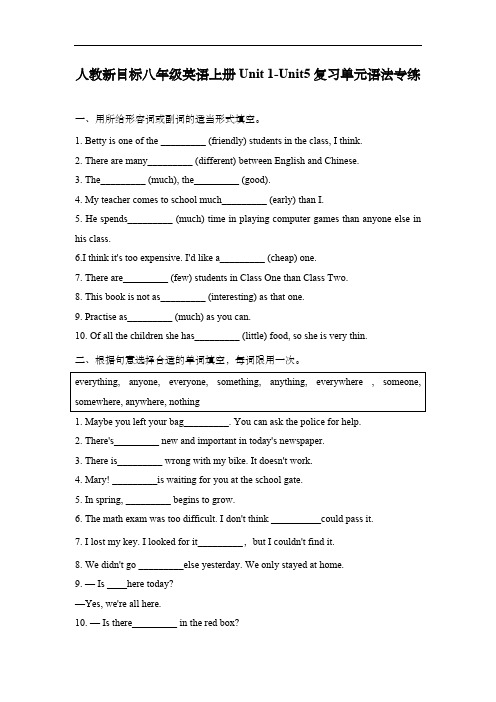
人教新目标八年级英语上册Unit 1-Unit5复习单元语法专练一、用所给形容词或副词的适当形式填空。
1. Betty is one of the _________ (friendly) students in the class, I think.2. There are many_________ (different) between English and Chinese.3. The_________ (much), the_________ (good).4. My teacher comes to school much_________ (early) than I.5. He spends_________ (much) time in playing computer games than anyone else in his class.6.I think it's too expensive. I'd like a_________ (cheap) one.7. There are_________ (few) students in Class One than Class Two.8. This book is not as_________ (interesting) as that one.9. Practise as_________ (much) as you can.10. Of all the children she has_________ (little) food, so she is very thin.二、根据句意选择合适的单词填空,每词限用一次。
everything, anyone, everyone, something, anything, everywhere , someone, somewhere, anywhere, nothing1. Maybe you left your bag_________. You can ask the police for help.2. There's_________ new and important in today's newspaper.3. There is_________ wrong with my bike. It doesn't work.4. Mary! _________is waiting for you at the school gate.5. In spring, _________ begins to grow.6. The math exam was too difficult. I don't think __________could pass it.7. I lost my key. I looked for it_________,but I couldn't find it.8. We didn't go _________else yesterday. We only stayed at home.9. — Is ____here today?—Yes, we're all here.10. — Is there_________ in the red box?—No, there isn't.三、用所给动词的适当形式填空。
人教新目标英语八年级上册unit1重点短语和句子归纳总结

人教新目标英语八年级上册Unit1 Where did you go on vacation 重点短语1.visited museums 参观博物馆2.went to summer camp/ the mountains 去夏令营/爬山3.stayed at home 呆在家4.go on vacation 度假5.study for tests 准备考试6.meet anyone interesting 遇见有趣的人7.do/ Buy anything special做\ 买特别的东西8.anywhere interesting 有趣的地方9.take quite a few photos照很多照片10.most of the time 大多数时候11.taste really good/ great.尝起来真好极了12.buy something for somebody= buy somebodysomething 为某人买某物13.in the countryside在农村14.at a restaurant在饭店15.keep a diary写日记16.arrive in / at= get to = reach 到达….17.decide to do something 决定做……18.near our hotel在我们的宾馆附近19.try paragliding ( try doing something) 尝试滑翔(尝试做….)20.feel like doing something 感到喜欢做……,好像……21.ride bicycles to Georgetown 骑自行车到了Georgetown22. a lot of new buildings 许多新建筑23.many of the old buildings许多老建筑24.Chinese traders from 100 years ago 100年前的中国商人25.enjoy walking around the town 喜欢在市里漫步26.walk up to the top of the hill步行上山顶27.start raining a little 开始下小雨28.take the train乘火车29.waited over an hour for the train 等了两个多小时的火车30.enough money 足够的钱31.old enough足够老32.another two hours 另外两个小时33. a bag with some food and water装有食物和水的口袋34.so… that…如此……以至于……35.keep going继续走36.go on继续37.jump up and down跳上跳下38.in excitement兴奋地39.twenty minutes later20分钟以后40.bring an umbrella带雨伞41.home cooking家常菜重点句子42.It was my first time there.这是我第一次到那儿。
人教版新目标八年级上册英语知识点全册

Unit1 Where did you go on vacation?重点短语1. go on vacation去度假2.stay at home 待在家里3.go to the mountains 去爬山4. go to the beach 去海滩5. visit museums 参观博物馆6. go to summer camp 去参加夏令营7.quite a few 相当多8.study for 为……而学习9.go out 出去10.most of the time 大部分时间11. taste good 尝起来很好吃12.have a good time 玩得高兴13. of course 当然14.feel like 给……的感觉;感受到15.go shopping 去购物16.in the past 在过去17. walk around 四处走走18. because of 因为19. one bowl of… 一碗……20. the next day 第二天21. drink tea 喝茶22. find out 找出;查明23. go on 继续24.take photos 照相25. something important 重要的事26. up and down 上上下下27. come up 出来28. buy sth. for sb. / buy sb. sth. 为某人买某物29. taste + adj. 尝起来……30. look+adj. 看起来……31.nothing…but+动词原形除了……之外什么都没有32.seem+(to be)+ adj. 看起来……33. arrive in+大地点/ arrive at+小地点到达某地34.decide to do sth. 决定去做某事35. try doing sth. 尝试做某事/36. try to do sth. 尽力去做某事37. forget doing sth. 忘记做过某事/38. forget to do sth. 忘记做某事39. enjoy doing sth. 喜欢做某事40. want to do sth. 想去做某事41. start doing sth. 开始做某事42. stop doing sth. 停止做某事43. dislike doing sth.不喜欢做某事44. keep doing sth. 继续做某事45. Why not do. sth.? 为什么不做……呢?46. so+adj.+that+从句如此……以至于……47. tell sb. (not) to do sth. 告诉某人(不要)做某事48 .have a good time=enjoy oneself=have fun(doing sth.)玩得痛快三、重点句子:1. Where did you go on vacation? 你去哪儿度假的?2. Long time no see. 好久不见。
- 1、下载文档前请自行甄别文档内容的完整性,平台不提供额外的编辑、内容补充、找答案等附加服务。
- 2、"仅部分预览"的文档,不可在线预览部分如存在完整性等问题,可反馈申请退款(可完整预览的文档不适用该条件!)。
- 3、如文档侵犯您的权益,请联系客服反馈,我们会尽快为您处理(人工客服工作时间:9:00-18:30)。
八年级英语语法复习1) leave的用法1.“leave+地点”表示“离开某地”。
例如:When did you leave Shanghai? 你什么时候离开上海的?2.“leave for+地点”表示“动身去某地”。
例如:Next Friday, Alice is leaving for London. 下周五,爱丽斯要去伦敦了。
3.“leave+地点+for+地点”表示“离开某地去某地”。
例如:Why are you leaving Shanghai for Beijing? 你为什么要离开上海去北京?2) 情态动词should“应该”学会使用should作为情态动词用,常常表示意外、惊奇、不能理解等,有“竟会”的意思,例如:How should I know? 我怎么知道?Why should you be so late today? 你今天为什么来得这么晚?should有时表示应当做或发生的事,例如:We should help each other.我们应当互相帮助。
我们在使用时要注意以下几点:1.用于表示“应该”或“不应该”的概念。
常指长辈教导或责备晚辈。
例如:You should be here with clean hands. 你应该把手洗干净了再来。
2.用于提出意见劝导别人。
例如:You should go to the doctor if you feel ill. 如果感觉不舒服,你最好去看医生。
3. 用于表示可能性。
should的这一用法是考试中常常出现的考点之一。
例如:We should arrive by supper time. 我们在晚饭前就能到了。
She should be here any moment. 她随时都可能来。
3) What...? 与 Which...?1. what 与which 都是疑问代词,都可以指人或事物,但是what仅用来询问职业。
如:What is your father? 你父亲是干什么的?该句相当于:What does your father do?What is your father's job?Which 指代的是特定范围内的某一个人。
如:---Which is Peter? 哪个是皮特?---The boy behind Mary. 玛丽背后的那个男孩。
2.What...? 是泛指,所指的事物没有范围的限制;而Which...? 是特指,所指的事物有范围的限制。
如:What color do you like best?(所有颜色)你最喜爱什么颜色?Which color do you like best, blue, green or yellow?你最喜爱哪一种颜色?(有特定的范围)3. what 与which 后都可以接单、复数名词和不可数名词。
如:Which pictures are from China?哪些图片来自中国?4) 频度副词的位置1.常见的频度副词有以下这些:always(总是,一直)usually(通常)often(常常,经常)sometimes(有时候)never(从不)2.频度副词的位置:a.放在连系动词、助动词或情态动词后面。
如:David is often arrives late for school.大卫上学经常迟到。
b.放在行为动词前。
如:We usually go to school at 7:10 every day.我们每天经常在7:10去上学。
c.有些频度副词可放在句首或句尾,用来表示强调。
如:Sometimes I walk home, sometime I ride a bike.有时我步行回家,有时我骑自行车。
3.never放在句首时,主语、谓语动词要倒装。
如:Never have I been there.我从没到过那儿。
5) every day 与 everyday1. every day作状语,译为“每一天”。
如:We go to school at 7:10 every day.我们每天7:10去上学。
I decide to read English every day.我决定每天读英语。
2. everyday 作定语,译为“日常的”。
She watches everyday English on TV after dinner.她晚饭后在电视上看日常英语。
What's your everyday activity?你的日常活动是什么?6) 什么是助动词1.协助主要动词构成谓语动词词组的词叫助动词(Auxiliary Verb)。
被协助的动词称作主要动词(Main Verb)。
助动词自身没有词义,不可单独使用。
例如:He doesn't like English.他不喜欢英语。
(doesn't是助动词,无词义;like是主要动词,有词义)2.助动词协助主要动词完成以下功用,可以用来:a. 表示时态,例如:He is singing.他在唱歌。
He has got married.他已结婚。
b. 表示语态,例如:He was sent to England.他被派往英国。
c. 构成疑问句,例如:Do you like college life?你喜欢大学生活吗?Did you study English before you came here?你来这儿之前学过英语吗?d. 与否定副词not合用,构成否定句,例如:I don't like him.我不喜欢他。
e. 加强语气,例如:Do come to the party tomorrow evening. 明天晚上一定来参加晚会。
He did know that.他的确知道那件事。
3.最常用的助动词有:be, have, do, shall, will, should, would7) forget doing/to do与remember doing/to do1.forget to do忘记要去做某事(未做);forget doing忘记做过某事(已做)The light in the office is still on. He forgot to turn it off.办公室的灯还在亮着,它忘记关了。
(没有做关灯的动作)He forgot turning the light off.他忘记他已经关了灯了。
( 已做过关灯的动作)Don't forget to come tomorrow.别忘了明天来。
(to come动作未做)典型例题---- The light in the office is still on.---- Oh,I forgot___.A. turning it offB. turn it offC. to turn it offD. having turned it off答案:C。
由the light is still on 可知灯亮着,即关灯的动作没有发生,因此用forget to do sth.而forget doing sth表示灯已经关上了,而自己忘记了这一事实。
此处不符合题意。
2.remember to do记得去做某事(未做);remember doing记得做过某事(已做)Remember to go to the post office after school.记着放学后去趟邮局。
Don't you remember seeing the man before? 你不记得以前见过那个人吗?8) It's for sb.和 It's of sb.1.for sb. 常用于表示事物的特征特点,表示客观形式的形容词,如:easy, hard,difficult,interesting,impossible等:It's very hard for him to study two languages. 对他来说学两门外语是很难的。
2.of sb的句型一般用表示人物的性格,品德,表示主观感情或态度的形容词。
如:good, kind, nice, clever, foolish, right。
It's very nice of you to help me. 你来帮助我,你真是太好了。
3.for 与of 的辨别方法:用介词后面的代词作主语,用介词前边的形容词作表语,造个句子。
如果道理上通顺用of,不通则用for。
如:You are nice.(通顺,所以应用of)。
He is hard.(人是困难的,不通,因此应用for。
)9) 对两个句子的提问新目标英语在命题中有将对句子划线提问这一题型取消的趋势,现在采取的作法是对一个句子进行自由提问。
例如:句子:The boy in blue has three pens.提问:1. Who has three pens?2. Which boy has three pens?3. What does the boy in blue have?4. How many pens does the boy in blue have?很显然,学生多了更多的回答角度,也体现了考试的灵活性。
再如:句子:He usually goes to the park with his friends at 8:00 on Sunday.提问:1. Who usually goes to the park with his friends at 8:00 on Sunday?2. Where does he usually go with his friends at 8:00 on Sunday?3. What does he usually do with his friends at 8:00 on Sunday?4. With whom does he usually go to the park at 8:00 on Sunday?5. What time does he usually go to the park with his friends on Sunday?6. When does he usually go to the park with his friends?10) so、such与不定冠词的使用1.so与不定冠词a、an连用,结构为“so+形容词+a/an+名词”。
如:He is so funny a boy.Jim has so big a house.2.such与不定冠词a、an连用,结构为“such+a/an+形容词+名词”。
